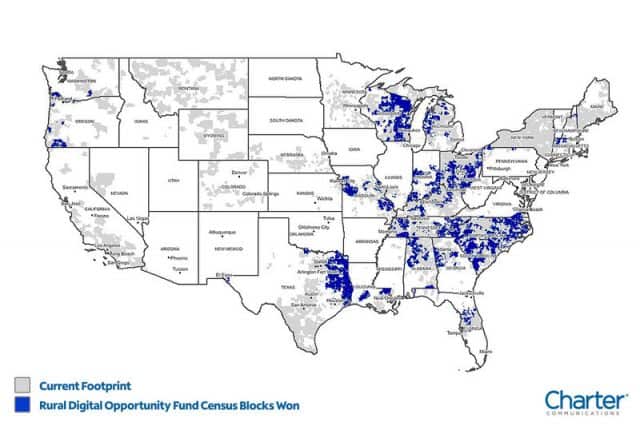Charter Communications will spend almost $5 billion a part of a multiyear, 24-state broadband buildout to deliver high-speed internet service to more than a million unserved homes and businesses.
Approximately $1.2 billion of the cost to serve these low-density, mostly rural communities will come from the federal government’s Rural Digital Opportunity Fund (RDOF), which is subsidizing some of the expenses associated with providing service in areas deemed unprofitable to serve.
Preparation and planning for Charter’s RDOF Phase 1 broadband buildout has already begun, with an additional 2,000 employees and contractors expected to focus on Charter’s rural expansion efforts in Alabama, California, Florida, Georgia, Illinois, Indiana, Kentucky, Louisiana, Massachusetts, Michigan, Missouri, New Hampshire, New Mexico, North Carolina, Ohio, Oregon, Pennsylvania, South Carolina, Tennessee, Texas, Vermont, Virginia, Washington, and Wisconsin.
The biggest expansions in coverage area appear to be in North and South Carolina, North and Eastern Wisconsin, East Texas, Ohio, and Eastern Tennessee.

Charter’s RDOF Expansion Project Map
The network Charter will build in these rural areas will offer Spectrum 1 Gbps high–speed broadband access to all newly served customer locations with starting speeds of 200 Mbps, with no data caps, modem fees, or contracts. Customers will also be able to subscribe to Spectrum TV, home phone and wireless mobile service.
Charter CEO Thomas Rutledge said one of the most important factors governing when service will become available is how well the cable company will be received by the owners of utility poles in the various regions.
“The more cooperation we have with the pole owners and utility companies, the faster we can connect these communities with high-speed internet services,” Rutledge said in a company news release. “We look forward to working with local municipalities, electric cooperatives, and investor-owned utilities to ensure that permits are obtained in a timely, fair and cost-effective fashion.”


 Subscribe
Subscribe